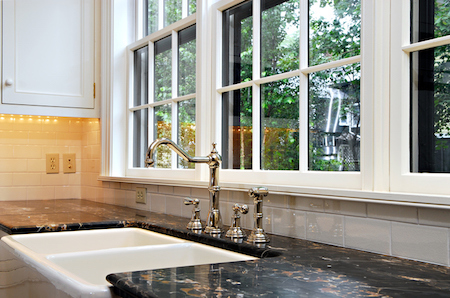
How to Choose the Right Kitchen Sink
In the wide world of kitchen décor, the sink is rarely a star. Sandwiched between the granite countertops and the kitchen backsplash, it is perhaps the last thing homeowners think about. But considering how often we use it, and the different chores we use it for, the sink deserves a considered choice.
Kitchen design consultants at HGTV provide kitchen sink basics to think about:
Size and Shape
Classic Farmhouse
A large, single-basin sink, this classic design works well if you plan to use it for multiple chores beyond washing dishes, such as cleaning over-sized pots, pans and baking sheets, or bathing dogs or babies. More common is the double farmhouse sink, with two basins of equal size.
Traditional Double Sink
With two basins of different size, these allow the user to prep in the smaller size and clean up in the larger one, or separately wash small items you don’t want to put in the dishwasher. While the 60/40 split is most common, many models offer two sinks of varied size options.
Three-Basin
This sink features two basins of equal size, with one small one and a garbage disposal in the center. It’s a good choice if you want to keep food scraps away from the basins where you prep and clean.
Rounded Sides
Some homeowners consider a curved sink easier to clean than one with square edges, and the sleek, minimalist look is attractive.
Materials
Stainless Steel
This is easy to clean and offers a contemporary look, but metal can scratch. Most manufacturers offer bottom grids—wire trays placed in the bottom of the sink to prevent scratching. If you live in an area with hard water, water spots can be a problem.
Porcelain
This looks authentic in kitchens with a vintage style, and if you love color, the choices are endless. Porcelain sinks can chip, however, and metal pans can leave black scuff marks that are difficult to remove.
Granite Composite
Made of granite particles and polymers, these sinks resist scratches and chips and do not show water spots. Lighter-colored granite composite sinks can stain, however, and some special maintenance may be required.
Natural Stone
Natural stone (soapstone being the most common choice) can exactly match your countertop material. But it’s costly, and it can scratch and chip. Special cleaning products may be required.

